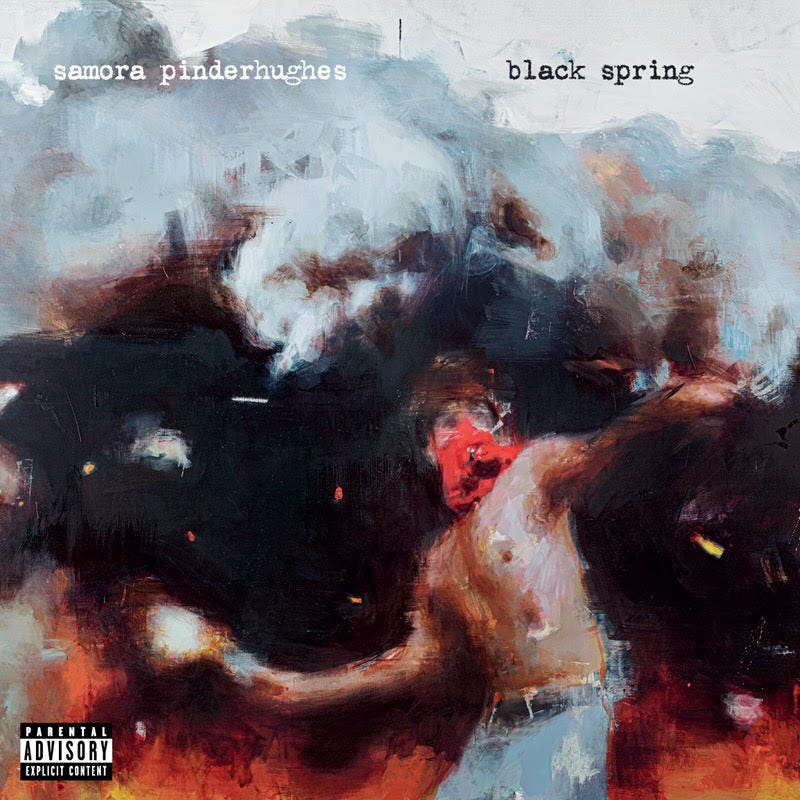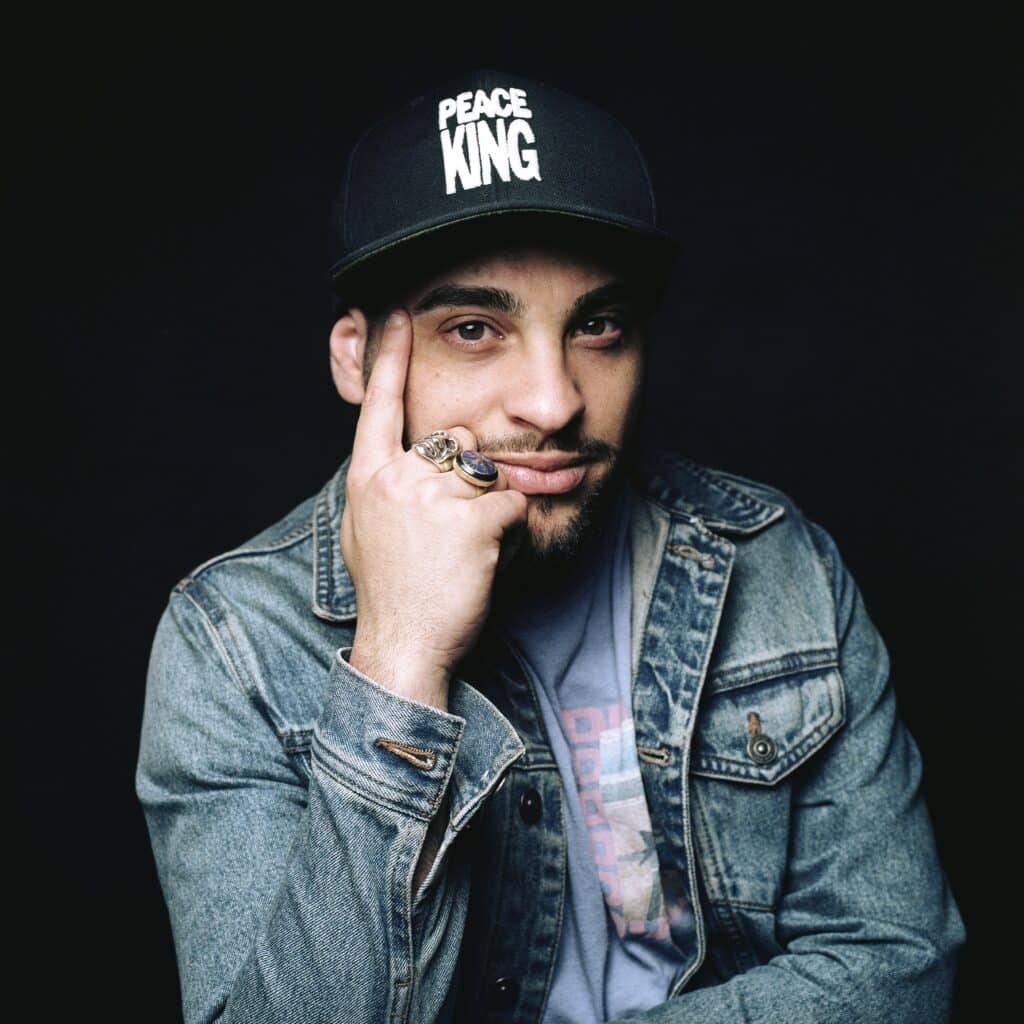I have been looking for art, music in particular, that speaks to the moment.
I am not trying to look down on party music, which I feel has its crucial place; and joy can be a kind of resistance for the downtrodden. But the place we find ourselves in right now—with the United States of America engaged in a twisted plan to make 2025 1619 again, and resistance from the Democratic Party being as stunningly, perhaps intentionally, ineffectual as it is—calls for a kind of musicality that encourages more than just competition, making money, smoking blunts, shaking asses, and getting laid.
In fact, when these things become the primary messages of the music marketed to marginalized communities, it begins to feel like a devious strategy to distract, pacify, seduce, and sedate; to say, Hey, look y’all! Party over here!, while over there, they rebuild the auction blocks, steel instead of wood this time, for our nouveau enslavement. If you have read their manifesto, Project 2025, then you know that this is not hyperbole. If you have been watching as Trump/Vance/Musk and rest of the MAGA cult have been ripping and running through the streets, kidnapping people and using the U.S. Constitution to wipe their asses with, as the U.S. Supreme Court uses the shit itself as the ink to co-sign on what can only been called a Jim Crowian (if not antebellum) barbarism, you know this is not an exaggeration.
This is deadly serious.
I hate to be the one to say it because people hate a killjoy, but the party is over.
If you do not believe me, at least believe Supreme Court Justice Ketanji Brown Jackson, whose clarion calls have broken with the so-called traditions that have already been usurped by the batwing conservatives on the court. Her clarity is so outside the realm American possibility that even the liberal justices on the court are scared to follow her. I don’t necessarily compare her actions to, say, Harriet Tubman’s; that would be far too generous an association for anybody occupying a seat of power in a government that plants and tends to genocides. But I can tell you that they both, in their own ways, present a particular kind of unpopular truth. I can tell you, however, that Amy Coney Barrett is fully in her Missy Anne petticoats such that I cannot detect any noticeable distinctions between the two of them.
I have been reading books about fascism; about how it thrives and about how it can be stopped. I am frightened by what I have discovered. I have discovered that if we think we can protest or speechify or symbolism our way out of this troublesome time, we are in for a painful awakening. Never once has a peaceful protest or a logical argument or a spiritual practice or a solidarity t-shirt toppled fascism. Not once in the history of human civilization, which is to say human conflict, have the despotic ever yielded to appeals for decency or even mercy.
No, the only thing—the only thing—that has ever stopped dictators dead in their tracks was a mass uprising. But because most Americans are so comfortable with the status quo and our various proximities to it (and I judge this not by what we say but by what we are unwilling to do), and because wars in our lifetime have always been the ones we brought to and left at the doorsteps of others, overseas, in far away lands: We talk much shit, but we are hopelessly squeamish in the face of a direct, face-to-face challenge. We are without the requisite hands; our arms are too short to box. We are not ready to face the role violence plays in toppling a fascist regime. We can’t even conceive of what Haitians understand intimately.
I know we are scared; terrified even. But they are out here shooting children in the face, Family. This is where head-up is the final answer. Love, the real kind, demands it.
And if it makes us feel any better: Violence does not have to be the first response. I know we have all heard of a general strike. As me and a sister-friend of mine were discussing a few days ago, this would require, above all else, unity; and, of course, great strategy and great sacrifice—not to mention moving in silence. But optimism about that option is hard to come by. Americans, maybe, are too addicted to convenience and luxury to ever consider being uncomfortable for a second, much less a year. Montgomery Bus Boycott energy is rare nowadays. And unity is difficult to achieve amongst a people determined to be The Only.
So what has all of this have to do with Samora Pinderhughes’s new album, black spring? The answer is in the title.
Speaking for myself, if I am to be prepared for the vicious road ahead, I need my hype viewing, my hype reading, and my hype listening. Courage can be as infectious as cowardice. I think. So, I want to cover myself in prime examples of the former. I need to know that I am not alone. Who are the artists pointing us in the direction of a better world rather than a zero-sum one, where fuck everybody/I’m getting mine is presented as goal and virtue? Which artists are telling the truth despite the risks? Who is rolling their wheelchair right up to the edge to meet the moment?
Who is being a witness?
Along with bands like Bob Vylan, who risk their livelihood in the name of justice, there is Samora Pinderhughes—who is not new to this, but has always been true to this.
My Brother Samora Pinderhughes is a composer, pianist, vocalist, filmmaker, and multidisciplinary artist known for striking intimacy and carefully crafted, radically honest lyrics alongside high-level musicianship. He is also known for using his music to examine sociopolitical issues and fight for change and works in the tradition of the Black surrealists throughout the African Diaspora, those who bend word, sound, and image towards the causes of revolution. Samora is a prison and police abolitionist, an anti-capitalist, and an advocate for process over product.
As an artist, Samora’s goal is that people will live differently after experiencing what he makes—that it will affect how they think, how they act, how they relate to others, how they consider their daily relationships to their country and their world.
Born and raised in the Bay Area, Samora began playing music at two years old and started piano at seven. His life changed forever when he was granted entry into the Young Musicians Choral Orchestra program, a free program for Bay Area youth, where he first studied harmony, learned about jazz, and began composing. He also studied music in Cuba for the time he and his family lived there in his youth. After graduating high school, he moved to New York to study at Juilliard under master teachers Kenny Barron and Kendall Briggs. It was also during this time that he met his primary artistic mentor, MacArthur-winning playwright Anna Deavere Smith.
This started him down the path of writing lyrics and combining film and theatre with his music in radical new ways. His first major political music project was The Transformations Suite, combining music, theatre, and poetry to examine the radical history of resistance within the communities of the African Diaspora, co-written by Christophe Abiel and Jeremie Harris. This was followed by The Black Spring EP in 2020, produced with Jack DeBoe, and songs including “Inertia,” “Process,” “No Plce,” and “Star-Blooded Work Song.”
Samora has collaborated with many artists across boundaries and scenes including Herbie Hancock, Common, Glenn Ligon, Sara Bareilles, Daveed Diggs, Titus Kaphar, and Lalah Hathaway. He works frequently with Common on compositions for music and film, and is featured as a composer, lyricist, vocalist, and pianist on the new albums August Greene and Let Love with Common, Robert Glasper, and Karriem Riggins. He has performed his compositions at Carnegie Hall, the Sundance Film Festival, and the Kennedy Center, and toured internationally with artists including Branford Marsalis, Christian Scott, Jose James, and Emily King.
He is the first-ever Art for Justice + Soros Justice Fellow and a recipient of Chamber Music America’s 2020 Visionary Award. He has also been designated as a Creative Capital awardee, a Joe’s Pub / Public Theater NYC Artist-in-Residence, and a Sundance Composers Lab fellow. He is a graduate of The Juilliard School and is currently getting his Ph.D. at Harvard University in the Creative Practice and Critical Inquiry program under the direction of Vijay Iyer.
He also scored the award-winning documentary, Whose Streets? and the Field of Vision film Concussion Protocol. The short film for his song “Process,” directed with Christian Padron, won 2021’s Best Experimental Film award at Blackstar Film Festival. He is a member of Blackout for Human Rights, the arts & social justice collective founded by Ryan Coogler and
, and was musical director for their #MLKNow and #JusticeForFlint events.Samora’s latest album, black spring, is a call to action for those of us who are looking around at the horrors happening all around us, many of them in our names. With songs like “Kill War,” “Am I Human,” and “Star Blooded Work Song,” this collection is meant to satisfy our desire for good music yes, but more importantly, gather and gird us for the battles ahead.
black spring drops on July 18. It can be purchased at bandcamp. To pre-save black spring at your chosen streaming service, please click: HERE. Pre-saving helps gauge and prove interest in Samora’s work.
The album’s first single, “Hold Fast” (featuring the The Healing Project Choir) is available now.
“It is our duty to fight for our freedom.
It is our duty to win.
We must love each other and support each other.
We have nothing to lose but our chains.”
― Assata Shakur, Assata: An Autobiography
Stay safe, family.
Blessings upon blessings,
Robert
Hype Listening
“Hold Fast” from black spring by Samora Pinderhughes
Hype Reading
Neo-Colonialism: The Last Stage of Imperialism by Kwame Nkrumah (Thomas Nelson and Sons, 1965)
Hype Viewing
Exterminate All the Brutes (2021) by Raoul Peck






